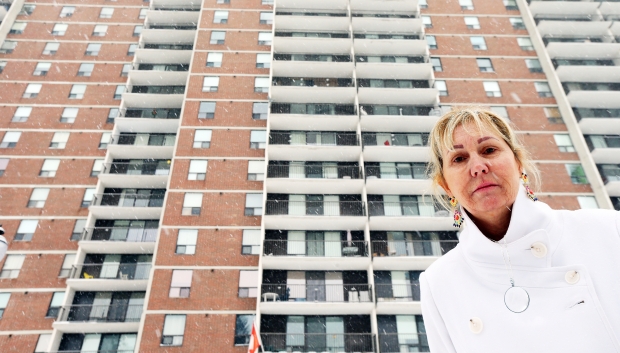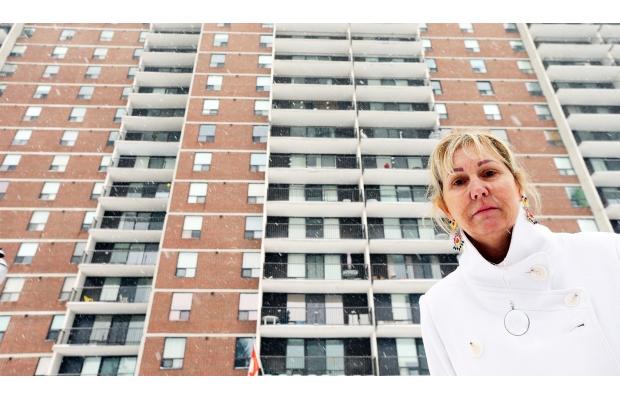Hugh Adami: $15.3M repair estimate leaves owners of Ottawa high-rise condo in shock

Condominium owner Rachelle Batamy says everyone was stunned by the news that their building at 665 Bathgate Dr. needs repairs that could total as much as $15.3 million. Owners face charges ranging from $40,000 to $66,000.
Photograph by: Jean Levac , Ottawa Citizen
These are anxious days at Las Brisas, an aging condominium highrise on Bathgate Drive, off Montreal Road.
Owners of the 275-unit building found out just before Christmas that a major overhaul of the highrise — which includes replacing the entire brick and cladding facade, from top to bottom, due to water penetration in many of the apartments — is planned over the next four years. The cost has been pegged at $15.3 million, though the condominium corporation’s board of directors believes the figure will fall.
As a result, owners face a “special assessment” — charges on top of the money they pay in monthly fees that partly go to the building’s reserve fund for future refurbishing. A portion of the $15.3 million will go to bolster the reserve fund, which is down to $200,000 and will have to meet provincial funding levels, set for all condominiums, by 2018.
Owners say the plans and costs were dropped on them like an “atomic bomb” at a Dec. 10 meeting. The retrofit, recommended in an engineering study, was approved by the condo corporation’s board of directors without any consultation with the owners. The board, which could be held liable for damages resulting from its failure to act on the report, was within its rights to proceed that way. But it did, under Ontario’s Condominium Act, have four months to mull over the proposals and consult with owners to see if there was a better way to proceed.
The owners — some of whom rent their properties — are facing charges of about $40,000 for a one-bedroom unit, $55,000 for a two-bedroom and $66,000 for a three. The money is to be paid in instalments through 2017 as contractors move from stage to stage of the overhaul. The first instalments — anywhere from $2,940 to $4,555 — were due Wednesday.
Owners were told Dec. 10 that they had to pay the money on the due dates or risk liens being placed on their units by the condo corporation. They recall being told if they did not have the money, they would simply have to find it.
Some seniors on fixed incomes say there have been many tears and sleepless nights as they fear losing their homes. Some young families with children say they are in the same predicament. Some have taken out personal lines of credit to cover the charges, but they are worried they will not be able to pay back their banks.
While there are owners who support the improvements and see the work as increasing their property values, others wonder if all of it, proposed by Keller Engineering Associates Inc., is necessary at this time. For example, they don’t understand why units that have not had water penetration need new exterior walls.
Many owners want the board to get a second opinion. It’s a position supported by Moti Flaster, founder of the Toronto-based Ontario Condominium Owners Association.
“Welcome to condominium living,” says Falster of the unexpected costs facing Las Brisas.
Some owners also want the board to see if a multi-year bank loan can be secured so that they don’t face huge charges in such a short period of time.
Owner Rachelle Batamy, who is semi-retired, says everyone was so stunned by the news that reaction at the Dec. 10 meeting was muted. But that changed as the news was digested and an owners’ association was formed. The association is threatening to overthrow the board for a new one if it doesn’t heed its demands for a second opinion.
Batamy is an awkward spot. She purchased another condominium on Riverside Drive a few months ago, is renovating it and was in the process of selling her unit at Las Brisas when the special assessment landed. Should she, she wonders, sell the Riverside condo and hope she can recoup all her costs and maybe gain some equity so she can pay her share of the special assessment? Or does she offer a significant discount on the asking price for her present home?
Seniors Marion and William Savolainien purchased their two-bedroom condo at Las Brisas in 2007. The status report for the unit, provided by the building’s former property managers, gave it “a clean bill of health.” Yet now, says Marion Savolainien, they are facing major construction and huge costs.
The work will involve removing and replacing the exterior brick wall of their two bedrooms, plus the interior drywall and the radiator heating system. Temporary walls will be installed in all bedrooms for the four-to-five-weeks of construction estimated for each unit. “We are all outraged,” says Savolainien.
The special assessment is necessary because the overhaul is far more costly than the what a condominium reserve fund could possibly handle. There is only about $200,000 in the Las Brisas reserve fund, which was depleted last year after a water pipe ruptured on the top floor during a plumping upgrade. The break caused flooding in corridors and one unit.
Money has been spent almost annually since the mid-1990s for repairs caused by water penetration in units due to the building’s problematic facade, according to Peter Irani, vice president of the condo corporation’s board of directors. (Irani says he stepped down as board president this week due to family matters.)
Irani says it was only after the present board was elected in late 2012 that they learned — from the outgoing property-management company — of the extent of the long-term problem.
Irani says various engineering companies had been brought in to see if a solution could be found. But only stopgap measures were carried out — such as plugging leaks in affected units and replacing damaged drywall and flooring.
So last year, Irani says, the new board decided to hire a different engineering company to provide a thorough examination of not only the exterior facade, but other components of the 42-year-old building.
What Keller Engineering found was not pretty. Not only do the exterior walls and interior drywall for every bedroom in the building have to be replaced, the supporting framing beneath the walls needs to be reinforced. Heating systems in each apartment will also be changed as will windows, including those on balconies.
Electrical and plumbing work is also planned, and major repairs have to be carried out to the underground parking garage due to road-salt corrosion.
In hindsight, says Irani, the board should have sat down with residents and explained the situation before approving the work. The result would likely have been the same, he says, but it might have resulted in less gnashing.
A meeting will be called to address owners’ concerns. He says a scond engineering firm will be hired for another opinion on how much work is needed, and the board is going to inquire about a bank loan for the condo corporation.
Irani says the board actually expects the total cost of the work to be considerably less once contractors start bidding on various aspects of the project. Keller, he says, provided highest-cost scenarios to be on the safe side. He also says replacing windows as the walls are rebuilt — even if some windows don’t need to be replaced immediately — will save owners a considerable amount of money in the long run.
Is something bothering you? Please contact: thepubliccitizen@ottawacitizen.com">thepubliccitizen@ottawacitizen.com

Condominium owner Rachelle Batamy says everyone was stunned by the news that their building at 665 Bathgate Dr. needs repairs that could total as much as $15.3 million. Owners face charges ranging from $40,000 to $66,000.
Photograph by: Jean Levac, Ottawa Citizen
We recommend
From around the web
-
Stop Paying So Much For Your Hotel Room. 4 Simple Steps to Cheaper Rates (A Luxury Travel Blog)
-
Unretirement ahead for more than half of Canadians (BrighterLife.ca)
-
How much do you need to save to retire? (BrighterLife.ca)
-
How people are paying Less Than $39 for New iPads (LifeFactopia)
-
How Cruise Lines Fill All Those Unsold Cruise Cabins (Lifestyle Journal)
The Ottawa Citizen Headline News
























